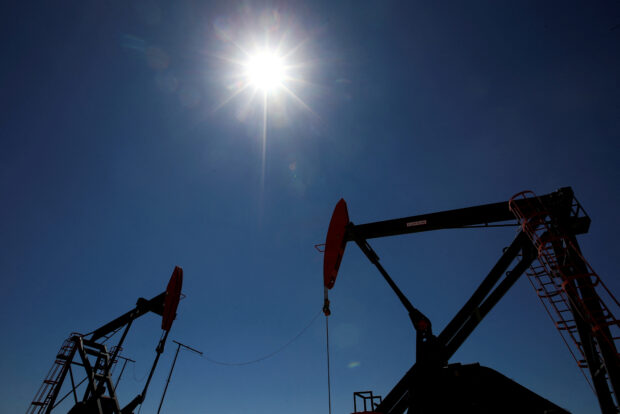Oil falls over 2% after Saudi pledge; investors keep wary eye on Israel

Oil rigs are seen at Vaca Muerta shale oil and gas drilling, in the Patagonian province of Neuquen, Argentina Jan 21, 2019. REUTERS/Agustin Marcarian/File Photo
NEW YORK –Oil prices fell over 2 percent on Wednesday as fears of disruption to supplies due to conflict in the Middle East receded a day after top OPEC producer Saudi Arabia pledged to help stabilize the market.
Brent futures fell $1.83, or 2.1 percent, to settle at $85.82 a barrel. U.S. West Texas Intermediate crude fell $2.48, or 2.9 percent , to settle at $83.49.
Brent and WTI had surged by more than $3.50 per barrel on Monday over concern the clashes between Israel and Palestinian Islamist group Hamas could escalate into a broader conflict that would disrupt global oil supply.
Prices settled slightly lower on Tuesday after Saudi Arabia said it was working with regional and international partners to prevent an escalation, and reaffirmed its efforts to stabilize oil markets.
“Both WTI and Brent retreated yesterday as concerns of a sudden and unexpected supply disruption have been swept aside for now,” PVM analyst Tamas Varga said.
Article continues after this advertisementREAD: OPEC+ maintains output reduction to boost oil prices
Article continues after this advertisementTrading house Mercuria sees oil prices reaching $100 a barrel if the situation in the Middle East escalates further, deputy CEO Magid Shenouda said on Wednesday.
“The only thing that is becoming clear for energy traders is that the road for the global growth recovery is getting rockier,” said Edward Moya, senior market analyst at OANDA, noting the “U.S. consumer is weakening (and) Germany might be headed for a deeper recession.”
Global economy
In Europe, the German government confirmed it expects the economy to contract by 0.4 percent this year because of persistently high inflation.
Russia and Saudi Arabia met in Moscow on Wednesday, when Russian President Vladimir Putin said that OPEC+ coordination will continue “for the predictability of the oil market.”
OPEC+ is the partnership between the Organization of the Petroleum Exporting Countries (OPEC) and its allies, including Russia.
Putin also urged companies to prioritize the Russian domestic market. The country’s ban on gasoline and some diesel exports was rolled back again last week as diesel exports that arrive at ports by pipeline were permitted.
READ: Russia lifts ban on most of diesel exports
In the U.S., producer prices increased more than expected in September amid higher costs for energy products and food, but underlying inflation pressures at the factory gate continued to abate.
U.S. investors will be looking ahead to the release of the Federal Reserve’s September policy meeting minutes due later on Wednesday for clues on future interest rate decisions.
Interest rate hikes to tame inflation can slow economic growth and reduce oil demand.
U.S. Treasury Secretary Janet Yellen said that she still expected the U.S. economy to experience a soft landing, despite “additional concerns” brought about by the situation in Israel.
READ: Fed officials turned more cautious in Sept as economic uncertainty grew
Uncertainty around the path of the U.S. economy pushed Federal Reserve officials into a cautious stance at their meeting last month, according to minutes of the Sept. 19-20 session.
Global oil inventories
In a report, the U.S. Energy Information Administration (EIA) projected global oil inventories would fall by 200,000 barrels per day in the second half of 2023 from voluntary output cuts from Saudi Arabia, along with reduced production targets among OPEC+ countries.
Exxon Mobil agreed to buy U.S. rival Pioneer Natural Resources in an all-stock deal valued at $59.5 billion that would make it the biggest producer in the Permian shell, the largest U.S. oilfield.
Analysts in a Reuters poll forecast U.S. crude inventories rose by 500,000 barrels in the week ended Oct. 6.
On U.S. supply, industry data showed crude stocks rose by about 12.9 million barrels in the week ended Oct. 6, according to market sources citing American Petroleum Institute figures on Wednesday.
EIA will release data on stockpiles on Thursday.